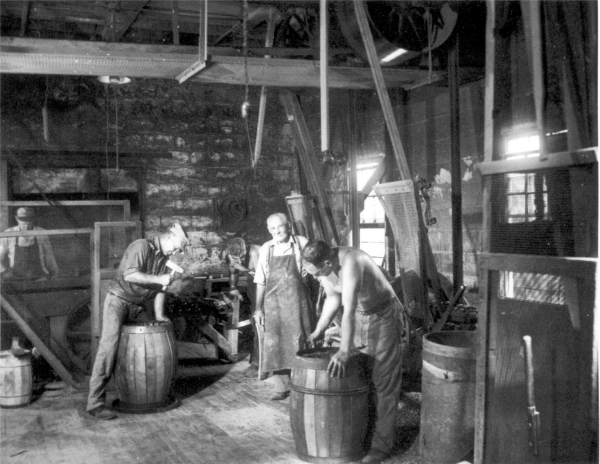We took a Hophead Tour earlier this month, and our tour guide (and Hophead Tour owner) Justin Schmitz told an interesting story about Hess Cooperage. I asked him to provide a little bit of that story of one of the early Madison entrepreneur success stories.
You have probably been to or heard of the Cooper’s Tavern up on the Capital Square. It features an image of a man, or cooper, in a long apron next to a wood barrel that he just completed assembling. It is only fitting we have a tavern in Madison with an homage to cooper’s since Madison was home to the last cooperage in the country. The Hess Cooperage was founded by Frank J. Hess in 1904 and he operated it with his 5 sons and daughter until 1966.
Frank J. Hess was born in the Bohemia region of what is now the Czech Republic in 1870. He served a three year apprenticeship in Pilsen, Bohemia to become a journeyman cooper and worked for another 4 years at the Striegl cooperage in Vienna. When Frank hit conscription age for the Prussian army, his father sold a heifer and sent him off to America in 1890. Frank landed in Chicago, finding work as a cooper. He eventually moved to Prairie du Chien with his wife and children to escape the hustle and bustle of Chicago.
In 1904, the breweries in Madison including Fauerbach, Hausmann and Breckheimer persuaded Frank to move to Madison and start his own cooperage. They set up shop at 1952 Atwood Ave., and they produced white oak barrels for the beer, wine and spirits industry. His 5 sons worked alongside him for the 62 years the shop was open.
During Prohibition, several of his sons had to find employment elsewhere while he maintained the business producing barrels for other needs products like butter, rennet, cheese, etc. He also opened a small grocery on the corner of 2nd and Atwood Ave that gave his sons another source of income. After Prohibition ended, only 5 cooperages remained in the country, and he immediately re-employed his sons and many others to meet the demand.
Eventually, the beer industry began replacing oak barrels with metal barrels, and business declined. When their biggest customer, Fauerbach Brewery, closed their doors in 1966, Hess Cooperage produced their last barrel and shut their doors as well.
So OgdenGlazer, again. Think about the ups and downs that Hess endured. They were making a lot of money making barrels for beer, wine and spirits using Wisconsin’s abundant source of timber, and then, BAM, prohibition. The products of their biggest customers are now illegal! That is called a forced pivot. But Wisconsin also has a lot of dairy, and those products needed barrels albeit in lower numbers than the beer industry. When alcohol production comes back online, Hess is back at full force. Then a new product comes along – metal barrels. The metal barrels came to the market partially because the demand for barrels was bigger than the demand. People looked for alternatives to the wooden barrels, and found the metal ones to be a suitable option. Unable to cope with the new competition, a 62 year old business closes its doors.
What does that mean? The lessons we learned were: Keep an eye on what’s happening around you. Outside factors can close big streams of revenue, but there may be options to keep you rolling – even if at a smaller size. Then, don’t sit on your laurels. Keep innovating and seeing how you can meet your clients’ demands. You can’t depend on what has always been there to remain if new products come along.


